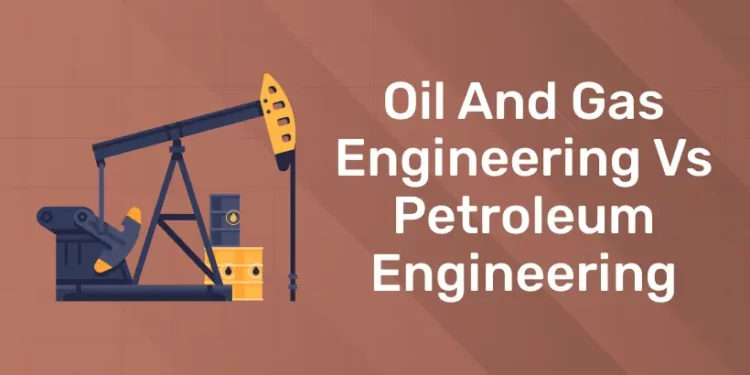Table of Contents
With an emphasis on distinct facets of the finding, extraction, and development of hydrocarbon resources, petroleum engineering and oil and gas engineering are closely connected disciplines in the energy sector. Oil and gas engineering is concerned with the optimization of conventional reservoirs, whereas petroleum engineering deals with both conventional and non-conventional sources. It is imperative that professionals comprehend these disparities. In this blog post we are exploring key differences and similarities between oil and gas and petroleum engineering.
Get Certified! Get Confident! Join our Oil and Gas Course!
Oil And Gas Engineering
The extraction, processing, and distribution of oil and natural gas are the main focuses of the dynamic and complex field of oil and gas engineering. The global economy and the ongoing transition to sustainable energy sources both depend on this field’s ability to meet the world’s energy needs.
Oil and gas engineers are multidisciplinary experts that extract and process these precious resources in a safe and efficient manner by utilizing a broad variety of skills and technological know-how. Engineering is covered in this subject in a number of ways, each with a focus.
Get Certified! Get Confident! Join our Oil and Gas Course!
Petroleum Engineering
1: What is the primary purpose of a refinery in the oil and gas industry?
A specialist area of engineering, petroleum engineering deals with the discovery, extraction, production, and administration of natural gas and oil resources. In order to maximize the recovery of hydrocarbons from underground sources and move them to the surface for processing and distribution, it comprises a variety of technological and scientific procedures. In the energy sector, where oil and gas are significant sources of both energy and revenue, petroleum engineers are indispensable.
Oil And Gas Engineering vs Petroleum Engineering
| Similarities | Differences |
| Natural gas and crude oil are examples of hydrocarbon resources that are explored, extracted, produced, and processed in both professions.
|
Oil and gas engineering is primarily concerned with the extraction and production of natural gas and crude oil. On the other hand, petroleum engineering can deal with a wider variety of hydrocarbon resources, such as heavy oil, oil sands, and oil shale. |
| For both fields a strong foundation in geology and geophysics is necessary.
|
Specialization in particular areas of the petroleum business, such as production, drilling, reservoir, or petroleum geology, is common in petroleum engineering. A wider scope of upstream, middle, and downstream operations may be covered by oil and gas engineering.
|
| Optimizing the production of hydrocarbons from underground reservoirs is the main goal of reservoir engineering, which is a component of both petroleum and oil/gas engineering.
|
While technical discoveries and improvements are beneficial to both sectors, the particular technologies and inventions used may differ. With regard to different kinds of reservoirs and extraction techniques, petroleum engineering may entail a wider range of technologies. |
| Drilling operations are a part of both disciplines, including planning and carrying out drilling schedules to access hydrocarbon sources.
|
Although there are job opportunities in the oil and gas business in both fields, the precise job roles and career pathways may vary. While oil and gas engineers may have more employment prospects across many energy business sectors, petroleum engineers may find chances in specialized roles within the industry.
|
| In order to optimize the production of gas and oil from reservoirs and to maximize recovery rates, petroleum and oil/gas engineers develop and apply production procedures.
|
The regulatory landscapes in which oil and gas engineering operates may vary based on the particular resource being extracted and the location of the operations. Regulatory considerations may also be a part of petroleum engineering, albeit the specifics of the projects may dictate a more limited focus.
|
| Petroleum engineering and the oil and gas sector have a global reach, offering job and project opportunities across the globe.
|
While oil and gas engineering programs may provide a more generalized approach covering different areas of the industry, petroleum engineering programs may have a more specialized curriculum covering a wider range of hydrocarbon resources and reservoir types.
|
| Technological advances in reservoir imaging, production optimization, and drilling techniques are beneficial to both disciplines.
|
Petroleum engineering research focuses on developing methods for finding and extracting hydrocarbon resources from unconventional sources, whereas oil and gas engineering covering various subjects including discovery, extraction, transportation, and energy use.
|
Entri App- Oil and Gas Course
One of our best courses is the Oil and Gas Course from Entri, which was designed especially for those who want to work in the oil and gas sector. It’s ideal for anyone who want to work in India or anywhere else in the world for a good salary.
Entri’s online Oil and Gas Course is unlike traditional classroom instruction. It’s a thorough training program that equips you with the skills and knowledge required to succeed in the exciting world of oil and gas. You’ll be able to put your newly acquired knowledge to use in practical situations, adding value to your degree and raising your chances of landing a dream job.
CONCLUSION
Petroleum engineering and oil and gas engineering are closely linked fields that have many things in common but also stand out for different reasons. The big picture, or the entire home, is petroleum engineering. It includes every facet of finding, obtaining, and producing gas and oil. This covers transportation, reservoir management, and drilling. Conversely, oil and gas engineering is more akin to a room within that home. It’s a branch of petroleum engineering that concentrates mostly on producing and extracting gas and oil. It’s more about the gritty work of extracting that black gold and putting it in your stove, heater, or automobile.
Get Certified! Get Confident! Join our Oil and Gas Course!
Frequently Asked Questions
What are some emerging technologies in oil and gas engineering and petroleum engineering?
Advanced drilling techniques (like horizontal drilling and hydraulic fracturing), improved oil recovery techniques, reservoir simulation and modeling software, remote sensing and monitoring technologies, digitalization and automation of production processes are some examples of emerging technologies in these fields.
How can I pursue a career in oil and gas engineering or petroleum engineering?
People can seek pertinent education and training in petroleum engineering, oil and gas engineering, or similar subjects to pursue careers in these fields. It can also be helpful to obtain experience through co-ops, internships, or entry-level jobs in the field. People can efficiently navigate their career pathways by keeping up with industry advances and trends through networking with other professionals in the field.
What are the job prospects like for oil and gas engineers or petroleum engineers?
The demand for jobs in various disciplines, as well as the state of the economy and technological developments, can all affect job prospects. In general, there is a need for qualified workers in the oil and gas sector, particularly in areas with substantial reserves or ongoing exploration and production activity.









